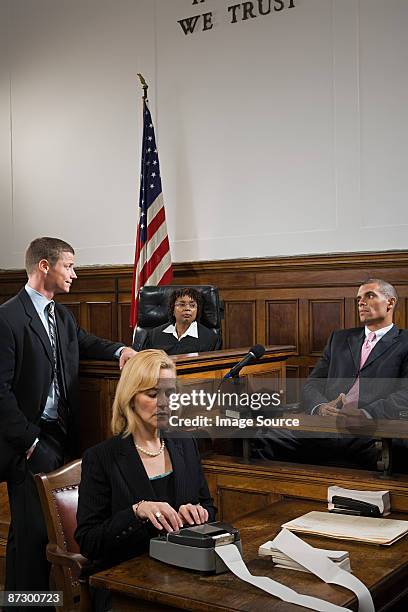Discover the Necessary Skills and Obligations of a Court Typist in Today's Legal Landscape
As a court typist, you hold a vital setting in the legal system. Your skills surpass just inputting; they entail recognizing complicated legal terms and treatments while ensuring accuracy in every record. You work together very closely with judges and attorneys, making your role vital for reliable interaction. What details skills do you need, and how can you adapt to the ever-evolving technical landscape? Let's discover this even more.
The Function of a Court Typist in the Judicial System
As the foundation of the judicial system, a court typist plays an essential duty in ensuring that lawful procedures are precisely documented. You are accountable for recording whatever from witness statements to judges' rulings, catching every information with precision. Your work aids keep a clear and long-term record of court tasks, which is vital for future reference and appeals.In the court, you're typically the unrecognized hero, quietly guaranteeing that all spoken words become composed records. You maintain discretion, comprehending the sensitive nature of lawful issues. You additionally work together very closely with clerks, attorneys, and judges to ensure the smooth circulation of information. By functioning efficiently under stress, you contribute to the total efficiency of the judicial procedure. Your attention to detail and dedication to accuracy not just support the integrity of the court yet additionally support the more comprehensive quest of justice in society.
Essential Skills Required for Court Typists
Court typists need a special blend of abilities to stand out in their necessary role within the judicial system. Primarily, you need to have superb typing skills, usually accomplishing speeds of 70 words per minute or even more. Precision is important; also a small error can bring about significant misconceptions in lawful documents. You'll likewise require strong interest to information, guaranteeing every word is transcribed correctly.Additionally, great organizational skills are crucial for taking care of numerous cases and files effectively. Being tech-savvy is vital, as you'll make use of various software application for word handling and record management. Strong communication skills assist you engage with courts, legal representatives, and other court personnel effectively.Lastly, a sense of professionalism and trust and discretion is a must, as you'll manage sensitive information daily. By refining these abilities, you'll be well-prepared to add significantly to the courtroom atmosphere.
Recognizing Lawful Terms and Treatments
As a court typist, you require to comprehend crucial lawful terms and procedures to execute your job efficiently. Understanding these ideas not only helps you transcribe precisely however additionally guarantees you can follow the circulation of court proceedings. Allow's explore the essential lawful vocabulary and an overview of court procedures you ought to understand.

Trick Legal Terms
Recognizing vital legal terms is important for any person functioning in a courtroom setting. You'll regularly experience terms like "complainant," which describes the person initiating a claim, and "offender," who replies to the accusations. Recognizing the distinction in between "civil" and "criminal" situations aids you realize the context of the proceedings. Knowledge with "subpoena" warranties you understand the lawful documents engaging witnesses to indicate. In addition, terms like "evidence" and "statement" are crucial, as they connect straight to the information presented in court. Grasping these terms not only enhances your efficiency as a court typist but also ensures that you add to the accuracy and clearness of lawful files. Your role depends upon precise terminology, so don't take it gently!
Court Procedures Introduction
Knowledge with crucial lawful terms sets the stage for understanding court procedures. Understanding just how a court room features is crucial for any type of court typist. You'll run into processes like arraignments, where defendants hear charges, and movements, which are demands for a court ruling. Acquaint on your own with the functions of attorneys, staffs, and courts, as each plays a vital part in process. Understanding the circulation of a test-- from court selection to closing arguments-- helps you properly capture the procedures - court typist. In addition, comprehending the importance of preserving a exact and neutral record can't be overemphasized. By mastering these aspects, you'll boost your effectiveness in documenting essential court activities and contribute significantly to the legal procedure. Your role is critical in protecting the honesty of court documents
The Influence of Technology on Court Entering
Modern technology's transformed court inputting in significant methods. With digital transcription devices, you can increase efficiency and precision, making your job less complicated than ever. Plus, remote court proceedings have actually changed just how you approach your job, needing flexibility to brand-new styles and innovations.
Digital Transcription Devices
As digital transcription devices continue to develop, they're changing the method court typists do their tasks. These tools improve the transcription procedure, permitting you to capture spoken words accurately and efficiently. With voice recognition software, you can record real-time process, see this site reducing manual input and minimizing errors.Moreover, cloud-based systems enable simple access to documents, so you can function collaboratively with legal teams and ensure every person's on the very same page. Automated formatting functions save you time on repeated jobs, letting you concentrate on content quality.Additionally, electronic tools boost protection, safeguarding delicate details via encrypted storage space and controlled access. By accepting these innovations, you can improve your efficiency and preserve the high criteria needed in the lawful field.
Remote Court Process
The rise of remote court procedures has substantially changed the landscape for court typists. You now count on technology to record and transcribe live hearings from your home or office. Familiarity with video conferencing platforms is necessary, as you'll need to navigate them seamlessly to assure an exact record. You'll likewise need to take care of audio top quality, as history noise or link problems can interrupt your job. Additionally, remote proceedings demand fast thinking; you may need to clear up declarations or demand repeats in real-time. Remaining arranged and efficient is critical, as due dates stay limited. Accepting these technical developments not just enhances your abilities but additionally guarantees you continue to be an invaluable possession in today's evolving lawful atmosphere.
Precision and Focus to Information in Transcription
Accuracy and attention to detail are crucial in transcription, specifically for court typists. court typist. Every word matters when you're recording legal process. A single blunder can change the significance of a declaration, potentially affecting the result of a situation. You must listen carefully, assuring that you catch every subtlety visit and inflection in the audio speaker's voice.Your ability to capture typos and grammatic mistakes is essential. You don't simply kind; you verify that the final document is a specific representation of what was said in court. This needs a keen eye and a complete understanding of lawful terminology.Moreover, you'll need to be aware of different accents and talking designs, as courts can organize a variety of speakers. By developing your precision and interest to information, you'll preserve the integrity of legal records and contribute considerably to the judicial procedure. Your persistance around truly makes a distinction

Time Management and Business Skills
While taking care of several tasks, effective time management and organizational skills are important for court typists. You'll usually handle numerous deadlines, from transcribing court process to preparing lawful records. Prioritizing your workload is important; determine immediate tasks and tackle them initially to guarantee timely submissions.Organizational abilities enter play when you're sorting through case transcripts, notes, and files. Maintaining whatever nicely categorized not just conserves time yet additionally lessens the threat of mistake. Using tools like calendars, to-do lists, or specialized software application can aid you remain on track and handle your time effectively.Moreover, establishing particular objectives for each and every job session can increase your performance. Damage bigger tasks into smaller jobs to make them a anonymous lot more manageable. By refining these abilities, you'll not only improve your efficiency however additionally add significantly to the smooth operation of the legal process, guaranteeing everything runs like clockwork.
Proceeding Education And Learning and Specialist Advancement Opportunities
Spending in your skills does not stop with time administration and company. As a court typist, you'll discover that continuing education and learning and specialist growth are important to remaining affordable in the lawful field. Try to find workshops or on the internet programs focusing on advanced keying techniques, legal terminology, and transcription software program. These can sharpen your skills and help you adapt to the current technologies.Networking is similarly crucial. Sign up with expert companies like the National Court Reporters Association (NCRA) or neighborhood lawful organizations. They usually offer resources, training sessions, and meetings that can enhance your understanding and connect you with peers.Don' t forget about certification programs that can increase your integrity and marketability. Staying upgraded with the most recent fads and finest practices in lawful paperwork will certainly improve your effectiveness and accuracy, making you a very useful property to any type of legal group. Invest in your development, and you'll gain the rewards throughout your career.
Regularly Asked Inquiries
What Is the Normal Salary Range for a Court Typist?
A court typist's normal wage arrays from $30,000 to $55,000 annually, relying on experience and location. You could likewise discover opportunities for development with additional abilities, leading to boosted pay in the legal area.

Are Court Typists Required to Have a Legal Level?
Court typists do not need a legal degree, yet having one can be advantageous. You'll often locate that solid keying skills and understanding of legal terminology are extra important for success in this role.
What Are the Job Hours for a Court Typist?

Exactly How Do Court Typists Ensure Privacy in Their Job?
You ensure discretion by firmly taking care of delicate papers, making use of encrypted software application, and following rigorous procedures. You stay knowledgeable about privacy laws and only share information with licensed workers, keeping count on in the judicial process.
Can Court Typists Work From Another Location or Freelance?
Yes, you can work from another location or freelance as a court typist, especially if you have trusted modern technology and a safe setting. Many legal experts currently embrace remote job, offering adaptability and possibilities for independent typists. As the foundation of the judicial system, a court typist plays an important function in ensuring that lawful procedures are properly documented. As a court typist, you need to comprehend key lawful terms and treatments to perform your work efficiently. Understanding these terms not just enhances your performance as a court typist but additionally guarantees that you contribute to the accuracy and quality of lawful papers. The rise of remote court proceedings has greatly transformed the landscape for court typists. As a court typist, you'll find that proceeding education and learning and professional growth are necessary to staying competitive in the lawful field.
Comments on “Court Typist Training Programs You Should Consider”